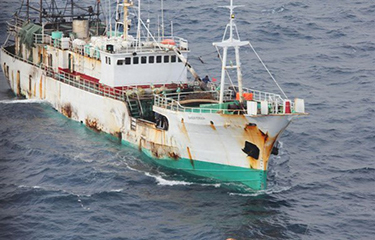A lack of oversight and proper regulation of seafood coming into the United States is resulting in American dollars continuing to support illegal, unreported, and unregulated (IUU) fishing, according to a new report from environmental non-governmental organization Oceana.
The report, “No Questions Asked,” found 60 percent of U.S. seafood imports escapes regulatory scrutiny, allowing IUU-tainted seafood to enter the supply chain. The report criticized the fact that the U.S. Seafood Import Monitoring Program (SIMP) only covers 13 seafood species.
“No one wants their seafood dinner coming with a side of forced labor or illegal fishing. But the bottom line is Americans are eating seafood from nations known for the most egregious behaviors at sea,” Oceana Campaign Director Marla Valentine said. “Oceana’s analysis exposes just how much seafood crosses our borders and goes onto our plates without any traceability requirements.”
Of the USD 30 billion (EUR 27.6 million) worth of seafood the U.S. imports, roughly USD 2 billion (EUR 1.8 billion) worth comes from China – and only 13 percent of those imports fall under SIMP oversight. The Chinese distant-water fleet has been accused of engaging in IUU practices around the world, including in the Galapagos marine sanctuary, and
However, the top five U.S. seafood imports from China are frozen tilapia fillets, frozen cod, frozen salmon fillets, frozen haddock fillets, and frozen Alaskan pollock fillets, according to the Oceana report – all species that are either farmed via aquaculture or largely imported into China for processing and then re-exported.
Still, China is just one of the countries Oceana listed as being associated with U.S. seafood imports possibly tainted by IUU associations. Russia, Vietnam, Taiwan, Cameroon, and more were all listed as countries with known IUU and human rights issues that the U.S. imports seafood from – with many species not covered under SIMP.
“The good news is the U.S. government has the tools to ensure all seafood sold in the United States is safe, legally caught, responsibly sourced, and honestly labeled,” Valentine said. “The Seafood Import Monitoring Program can shed light on notoriously opaque seafood supply chains and give the government enough information to proactively prevent illegally sourced seafood from entering the United States - but only if it is expanded to cover all seafood imports, instead of just a small handful. It’s time for NOAA to reject seafood sourced from IUU fishing and forced labor.”
Environmentalists have calledvfor the expansion of SIMP for years. NOAA has signaled it plans to expand the program, doubling the number of species targeted by the program.
The National Fisheries Institute, the top U.S. trade group representaing the U.S. seafood industry has long opposed the expansion of SIMP, on the grounds that it has done little to combat IUU. NFI Vice President of Communications Gavin Gibbons told SeafoodSource in January 2023 that a 2022 NOAA report to Congress acknowledged SIMP does not stop illegal products from entering the U.S. market – and that the primary goal of the program is to protect at-risk species.
“Attempts to expand SIMP to other species, under the guise of a more-comprehensive program, undercut an actual focus on risk,” Gibbons said. “NFI is committed to sustainable seafood trade and will participate in the comment process as this proposal moves forward.”
Photo courtesy of NOAA







